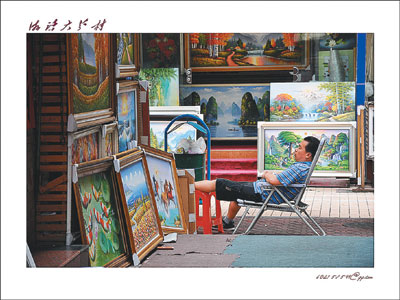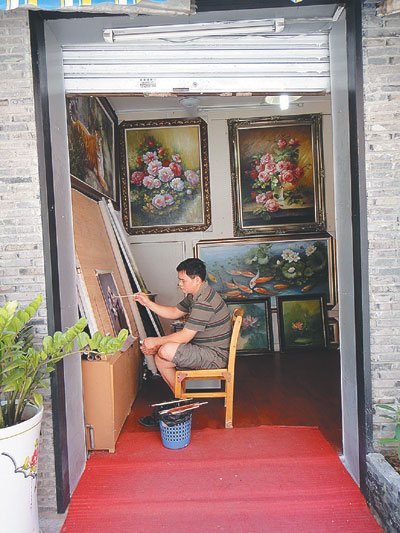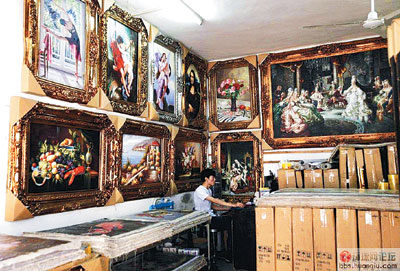|

Orders run dry at Dafen Oil Painting Village
THE exports volume has dropped sharply at Dafen Oil Painting Village, a world-renowned trade and exchange center for oil paintings in Longgang District, this year due to the European debt crisis.
According to the statistics, the total exports volume in the first half of this year only accounted for 52.3 percent of the total volume in the same period of last year and only about 30 percent of the volume in the first half of 2006, which was the most lucrative period in the village’s history.
“We have seen a decrease in orders from overseas this year, particularly from Europe and North America. In July, the whole village had under 1,000 orders,” Li, director of the management office of the village, told Shenzhen Economic Daily on Monday.
In the past, the majority of orders from abroad had come from Germany, but the village has received no orders from the country for two months. “This is a terrible sign. The European debt crisis has hit us hard and we have also seen a significant decrease in the number of European visitors at the village,” Li said.

“Many foreigners are struggling financially, so they have less time for recreational things such as art,” he joked.
As one of the largest distributors at the village, Non-Formula Art Co. has been particularly affected by the crisis. “In the first half of this year, our exports volume was only about 30 percent of the same period last year and about 14 percent of the same period in 2006,” said Shi Hui, president of the company and vice chairman of the Dafen association for artists.
Shi said that the village was not as crowded as it used to be. “In the past, it was common to see a foreigner in the village, but now they are a rarity. I have a 4,000-square-meter workshop in the village which will be relocated soon because I am unable to maintain its operation under such circumstances,” he said.
The aftermath of the global financial crisis in 2008 saw a similar situation, but the village recovered after receiving much protection from the government. “But this year’s situation is different and I think it will be very difficult for the village to return to its glory days,” said Xiong Zhenggang, a painter of original works based at the village.
The decrease in exports has affected everybody involved with the village, from dealers to painters. “In previous years, the number of painters and dealers at the village would increase along with demand. We didn’t have to worry about rent so we focused solely on market share. But now many painters have nothing to do and the warehouses are full of unsold paintings. Now painters and dealers are talking less about increasing the village’s market share. They have lowered their expectations and are talking about more prosaic things such as rent, sales figures and

salaries,” an unidentified dealer told the newspaper.
“Many young painters have left the village and I think the government should give financial support to those who still choose to stay here and rebuild the Dafen brand and survive this difficult time,” the dealer said.
(Wang Yuanyuan)
You say potato, I say tomato
PEOPLE in Taiwan use the term woxin to indicate the feeling of warmth and happiness; but the same word means the exact opposite, “upset”, on the mainland.
Tudou, which means potato on the mainland, refers to peanut in Taiwan.
People who travel between Taiwan and the mainland are often puzzled by such differences in the vocabularies used on the two sides of the Taiwan Straits.
In an effort to solve the problem, a group of literary people from Taiwan and the mainland compiled “A Cross-Straits Dictionary of Life,” which explains common vocabulary from Taiwan with its equivalent on the mainland.

Designed to be a manual for mainlanders who travel to Taiwan, the dictionary was released by the Culture and Art Publishing House at the Third Cross-Straits Chinese Character Art Festival, which concluded recently in Zaozhuang, Shandong Province.
Presented by Chinese National Academy of Arts and the General Association of Chinese Culture of Taiwan, the festival gathered a group of experts from both sides of the Straits to discuss the “origin and evolution of Chinese characters.”
According to Yang Tu, editor-in-chief of “A Cross-Straits Dictionary of Life,” the differences in the vocabularies of Taiwan and the mainland can be attributed to historical, social and cultural reasons.
Taiwan became a Japanese colony in 1895, and has been separated from the mainland for most of the time since. Japanese and the dialect of the Fujian people who make up the majority of Taiwan’s population have influenced the Chinese language they speak.
The dictionary is titled “Taipei Daodi, Didao Beijing,” using two words that both mean “authentic” but are spelt out in reverse, in Taiwan and the mainland.
“Such differences in vocabulary are very interesting humanistic and cultural manifestations,” Yang says.
The writing systems are also different on the two sides of the Straits, as the mainland adopts simplified Chinese characters, while Taiwan uses traditional characters.
However, Liu Chao-shiuan, president of Taiwan’s General Association of Chinese Culture, believes the difference in the languages from both sides of the Straits will decrease.
“Exchanges between Taiwan and the mainland have become increasingly common, and it’s natural that we are learning from each other,” he says.
Pop songs, films and TV shows from Taiwan have long influenced mainlanders. Since 2008, Taiwan has been open to mainland tourists, and more than 4 million mainlanders have traveled to Taiwan, accelerating exchanges between the two sides.
Words not only flow from Taiwan to the mainland, but also the other way around. Liu says many words from the mainland, such as “geili” (“giving strength”), are now understood by Taiwan people.
In February, the “Repository of Chinese Language” Web site went online, a collaboration between experts from both the mainland and Taiwan, in the hope of presenting a platform for the comprehensive documenting and understanding of Chinese language.
The Web site’s mainland address is zhonghuayuwen.org, while the Taiwan address is chinese-linguipedia.org.(SD-Agencies)
|

